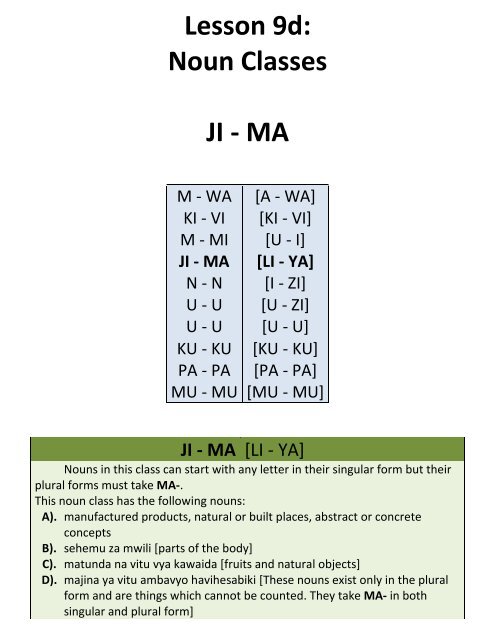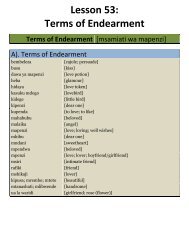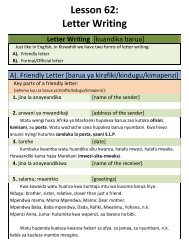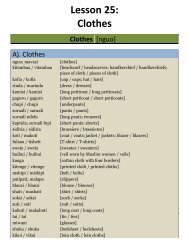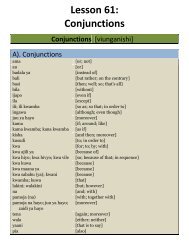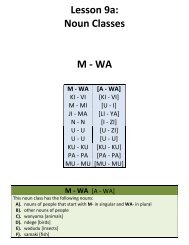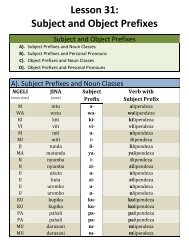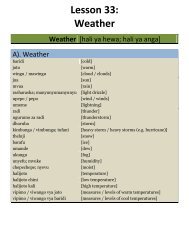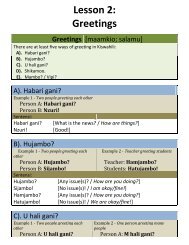Lesson 9d: Noun Classes JI - MA - Swahili
Lesson 9d: Noun Classes JI - MA - Swahili
Lesson 9d: Noun Classes JI - MA - Swahili
Create successful ePaper yourself
Turn your PDF publications into a flip-book with our unique Google optimized e-Paper software.
<strong>Lesson</strong> <strong>9d</strong>:<br />
<strong>Noun</strong> <strong>Classes</strong><br />
<strong>JI</strong> - <strong>MA</strong><br />
M - WA [A - WA]<br />
KI - VI [KI - VI]<br />
M - MI [U - I]<br />
<strong>JI</strong> - <strong>MA</strong> [LI - YA]<br />
N - N [I - ZI]<br />
U - U [U - ZI]<br />
U - U [U - U]<br />
KU - KU [KU - KU]<br />
PA - PA [PA - PA]<br />
MU - MU [MU - MU]<br />
<strong>JI</strong> - <strong>MA</strong> [LI - YA]<br />
<strong>Noun</strong>s in this class can start with any letter in their singular form but their<br />
plural forms must take <strong>MA</strong>-.<br />
This noun class has the following nouns:<br />
A). manufactured products, natural or built places, abstract or concrete<br />
concepts<br />
B). sehemu za mwili [parts of the body]<br />
C). matunda na vitu vya kawaida [fruits and natural objects]<br />
D). majina ya vitu ambavyo havihesabiki [These nouns exist only in the plural<br />
form and are things which cannot be counted. They take <strong>MA</strong>- in both<br />
singular and plural form]
A). Manufactured products, natural or built places,<br />
abstract or concrete concepts<br />
Manufactured products:<br />
blanketi/mablanketi [blanket/blankets]<br />
dirisha/madirisha [window/windows]<br />
gari/magari [car/cars]<br />
gazeti/magazeti [newspaper/newspapers]<br />
godoro/magodoro [mattress/mattresses]<br />
sanduku/masanduku [box/boxes]<br />
jiko/meko [gas cooker/gas cookers]<br />
Natural or Built places:<br />
baraza/mabaraza [veranda/verandas]<br />
daraja/madaraja [bridge/bridges]<br />
duka/maduka [shop/shops]<br />
shamba/mashamba [farm/farms]<br />
soko/masoko [market/markets]<br />
ziwa/maziwa [lake/lakes]<br />
jimbo/majimbo [state/states]<br />
Abstract or Concrete concepts:<br />
jina/majina [name/names]<br />
kosa/makosa [mistake/mistakes]<br />
neno/maneno [word/words]<br />
jambo/mambo [issue/issues]<br />
jiwe/mawe [stone/stones]<br />
somo/masomo [subject/subjects; lesson/lessons]<br />
wazo/mawazo [thought/thoughts]<br />
jibu/majibu [answer/answers]<br />
swali/maswali [question/questions]<br />
jukumu/majukumu [responsibility/responsibilities]<br />
juma/majuma [week/weeks]<br />
B). Sehemu za mwili [parts of the body]<br />
jicho/macho [eye/eyes]
jino/meno [tooth/teeth]<br />
bega/mabega [shoulder/shoulders]<br />
goti/magoti [knee/knees]<br />
sikio/masikio [ear/ears]<br />
tumbo/matumbo [stomach/bowels]<br />
paja/mapaja [thigh/thighs]<br />
C). Matunda na vitu vya kawaida<br />
[fruits and natural objects]<br />
Fruits:<br />
chungwa/machungwa [orange/oranges]<br />
embe/maembe [mango/mangoes]<br />
limau/malimau [lemon/lemons]<br />
nanasi/mananasi [pineapple/pineapples]<br />
papai/mapapai [pawpaw/pawpaws]<br />
dafu/madafu [coconut/coconuts (with milk)]<br />
tofaa/matofaa [apple/apples]<br />
Natural Objects:<br />
jani/majani [leaf/leaves]<br />
yai/mayai [egg/eggs]<br />
rinda/marinda [dress/dresses]<br />
D). Majina ya vitu ambavyo havihesabiki<br />
[nouns of things that cannot be counted, which<br />
exist only in the plural form<br />
maji/maji [water]<br />
mafuta/mafuta [oil]<br />
maharagwe/maharagwe [beans]<br />
mahindi/mahindi [corn]<br />
mali/mali [wealth]<br />
maafa/maafa [misfortune]<br />
matata/matata [problems]<br />
Zingatia [Note]
When using a verb, this noun class uses LI- in singular and YA- in<br />
plural for sentence formation.<br />
Sentence Formation<br />
Mifano:<br />
1. Chungwa limenunuliwa. [The orange has been bought.]<br />
Machungwa yamenunuliwa. [The oranges have been bought.]<br />
2. Gari limefika. [The car has arrived.]<br />
Magari yamefika. [The cars have arrived.]<br />
3. Jicho linauma. [The eye hurts.]<br />
Macho yanauma. [The eyes hurt.]<br />
4. Maji yamemwangika. [The water has been poured.]<br />
Maji yamemwangika. [The water has been poured.]


